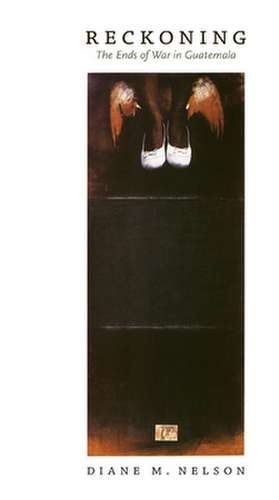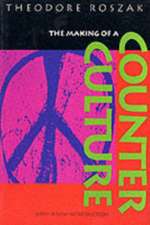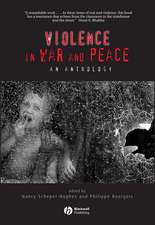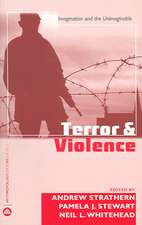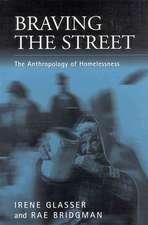Reckoning – The Ends of War in Guatemala
Autor Diane M. Nelsonen Limba Engleză Paperback – 17 mar 2009
Preț: 306.99 lei
Nou
Puncte Express: 460
Preț estimativ în valută:
58.76€ • 63.85$ • 49.39£
58.76€ • 63.85$ • 49.39£
Carte tipărită la comandă
Livrare economică 21 aprilie-05 mai
Preluare comenzi: 021 569.72.76
Specificații
ISBN-13: 9780822343240
ISBN-10: 082234324X
Pagini: 448
Ilustrații: 32 illustrations
Dimensiuni: 201 x 234 x 30 mm
Greutate: 0.64 kg
Editura: MD – Duke University Press
ISBN-10: 082234324X
Pagini: 448
Ilustrații: 32 illustrations
Dimensiuni: 201 x 234 x 30 mm
Greutate: 0.64 kg
Editura: MD – Duke University Press
Recenzii
The struggle to understand violence is a consuming task for many around the globe. Diane M. Nelson articulates stunning insights into the problem of understanding the violence in Guatemala and, by extension, our whole world of war and structural harm.Catherine A. Lutz, editor of The Bases of Empire: The Global Struggle against U.S. Military PostsReckoning can be described as an outline of a reparation ecology, a field that seems destined to expand in the years to come, as more and more cruel little wars repeat themselves in places and landscapes across the world. The book is, above all, about what comes after war, that is, how war makes people through forces that include duplicity and desire, despair and the continued hope to believe. It is, in short, about reckoning as a complex social, cultural, and political process and the ensuing ecologies of reparation in which we are all summoned to participate.Arturo Escobar, author of Territories of Difference: Place, Movements, Life, Redes
Notă biografică
Diane M. Nelson is Associate Professor of Cultural Anthropology at Duke University. She is the author of "A Finger in the Wound: Body Politics in Quincentennial Guatemala."
Textul de pe ultima copertă
"The struggle to understand violence is a consuming task for many around the globe. Diane M. Nelson articulates stunning insights into the problem of understanding the violence in Guatemala and, by extension, our whole world of war and structural harm."--Catherine A. Lutz, editor of "The Bases of Empire: The Global Struggle against U.S. Military Posts"
Cuprins
Pref/face. Little Did I Know xiii
AcKNOWLEDGEmeants xxxiii
Chapter One. Under the Sign of the Virgen de Transito 1
Intertext One. Those who Are Transformed 31
Chapter Two. The Postwar Milieu: Means, Ends, and Identi-ties 39
Intertext Two. Co-memoration and Co-laboration: Screening and Screaming 73
Chapter Three. Horror's Special Effects 86
Intertext Three. Confidence Games 115
Chapter Four. Indian Giver or Nobel Savage?: Rigoberta Menchu Tum's Stoll/en Past 126
Intertext Four. Welcome to Bamboozled! A Modern-Day Minstrel Show 156
Chapter Five. Anthropologist Discovers Legendary Two-Faced Indian 165
Intertext Five. Look Out! Step Right Up! Paranoia and Other Entertainmeants 197
Chapter Six. Hidden Powers, Duplicitous State/s 208
Intertext Six. Counterscience in Colonial Laboratories 242
Chapter Seven. Life during Wartime 252
Intertext Seven. How Do You Get Someone to Give You Her Purse? 280
Chapter Eight. Accounting for the Postwar, Balancing the Book/s 290
Chapter Nine. The Ends 322
Notes 327
Works Cited 361
Index 387
AcKNOWLEDGEmeants xxxiii
Chapter One. Under the Sign of the Virgen de Transito 1
Intertext One. Those who Are Transformed 31
Chapter Two. The Postwar Milieu: Means, Ends, and Identi-ties 39
Intertext Two. Co-memoration and Co-laboration: Screening and Screaming 73
Chapter Three. Horror's Special Effects 86
Intertext Three. Confidence Games 115
Chapter Four. Indian Giver or Nobel Savage?: Rigoberta Menchu Tum's Stoll/en Past 126
Intertext Four. Welcome to Bamboozled! A Modern-Day Minstrel Show 156
Chapter Five. Anthropologist Discovers Legendary Two-Faced Indian 165
Intertext Five. Look Out! Step Right Up! Paranoia and Other Entertainmeants 197
Chapter Six. Hidden Powers, Duplicitous State/s 208
Intertext Six. Counterscience in Colonial Laboratories 242
Chapter Seven. Life during Wartime 252
Intertext Seven. How Do You Get Someone to Give You Her Purse? 280
Chapter Eight. Accounting for the Postwar, Balancing the Book/s 290
Chapter Nine. The Ends 322
Notes 327
Works Cited 361
Index 387
Descriere
An examination of how Guatemalans are reckoning with the aftermath of a civil war that left fundamental assumptions about selves and others in tatters when it officially ended in 1996
